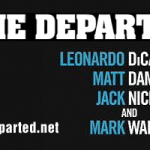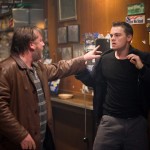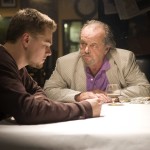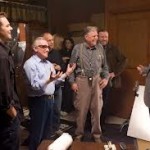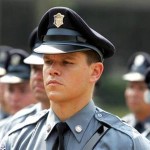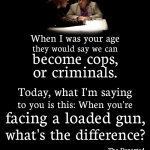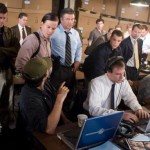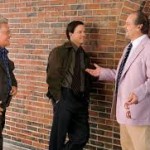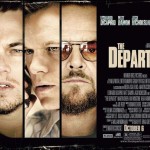So here we are again, yet another Scorcese epic on the same day I published my 4th Scorcese movie review and a brief summary of the strengths and weaknesses of his oeuvre. This time it’s another gangster pic, The Departed, following in the wake of Goodfellas, Mean Streets, Casino and others in the same genre (even Gangs of New York is about the mafioso of the day.)
It doesn’t take a genius to spot the developing trend, though each looks at its subject from a different perspective, and this example is much more the cat-and-mouse with the cops (Martin Sheen, Mark Wahlberg, Alec Baldwin and, inevitably, Leo DiCaprio – since it is a Scorcese picture) pitting their wits and their plants against the mobsters (Jack Nicholson and Matt Damon leading the way, Ray Winstone‘s hard man – though Winstone with a Boston accent sounds all wrong to me.) Oh and a psychiatrist too (Vera Farmiga) – stop me when this begins to sound familiar (see here and here.)
Under these circumstances, you could understand if The Departed descended into a very routine gangster movie like the type at one time churned out by the yard. All the stock clichés are in there somewhere, so it could have turned out to be a formulaic and conventional picture, albeit one with a quality director and cast and laden gratuitously in William Monaghan‘s script with every expletive known to man, then some.
Except it doesn’t. One very good reason for that is Nicholson’s Frank Costello. Big Jack’s take on the gangster profile defies the softly-spoken well-dressed family-loving shrewd schemer stereotype of Brando and the flashily psychotic wise guy of Pesci. Jack’s style as the boss, the daddy of his south Boston neighbourhood, is more lizard-like – deceptively laconic until the need arises, then moving rapidly. Psychotic for sure, but generally letting his burly henchmen do the hard work of killing or torturing anyone who gets in his way.
Costello is shabby in a way that only people wearing quality clothes can accomplish, and sports a scruffy beard. Outwardly he is genial but always faintly menacing (though not as OTT as The Shining) and charismatic to a tee, well… rather like Jack Nicholson, actually. Costello strolls around like he owns the place. Wait a second – he does own the place, and will make damn sure he stays one step ahead of the cops so no hot shot takes his neighbourhood away. His Irish-American credentials may be slightly dodgy, but few other actors know how to dominate the screen – after all, Nicholson knows no other way. Damon and DiCaprio are both pretty good here, but raw novices in terms of screen presence by comparison with the master.
Whether this portrayal flies slightly in the face of several real life mafioso caught in recent years, all of whom seem quiet family men who deliberately blend into the background and give little away. Maybe not relevant, though Costello sets an uncompromising tone for the movie right from the start:
“I don’t want to be a product of my environment. I want my environment to be a product of me. Years ago we had the church. That was only a way of saying – we had each other. The Knights of Columbus were real head-breakers; true guineas. They took over their piece of the city. Twenty years after an Irishman couldn’t get a fucking job, we had the presidency. May he rest in peace. That’s what the niggers don’t realize. If I got one thing against the black chappies, it’s this – no one gives it to you. You have to take it.”
You wonder what Costello would have made of Obama‘s election to the presidency, but leaving that aside the two derivations of this movie are worth noting: it is a remake of a Hong Kong film about corrupt police infiltrating a triad, and was originally called Infernal Affairs; the American version plausibly applies a similar plot to real life characters:
The film takes place in Boston. Irish Mob boss Francis “Frank” Costello plants Colin Sullivan as a mole within the Massachusetts State Police; the two characters are loosely based on famous gangster Whitey Bulger and corrupt FBI agent John Connolly, who grew up with Bulger. Simultaneously, the police assign undercover trooper William “Billy” Costigan to infiltrate Costello’s crew. When both sides realize the situation, each man attempts to discover the other’s true identity before his own cover is blown.
Further nods and homages too in the principle themes of Scorcese’s movie, described thus by Wikipedia:
Film critic Stanley Kauffmann describes a major theme of The Departed as one of the oldest in drama—the concept of identity—and how it “affects one’s actions, emotions, self-assurance and even dreams.”
The father-son relationship is a motif throughout the film. Costello acts as a father figure to both Sullivan and Costigan while Queenan acts as Costello’s foil in the role of father-figure, presenting both sides of the Irish-American father archetype. Sullivan refers to Costello as “Dad” whenever he calls to inform him of police activities.
In the final scene, a rat is seen on the window ledge. Scorsese acknowledges that while it is not meant to be taken literally, it somewhat symbolizes the “quest for the rat” in the film and the strong sense of distrust between characters, much like post-9/11 America. The window view behind the rat is a nod to gangster films like Scarface, Little Caesar, and White Heat.
Throughout the film, Scorsese uses an “X” motif to foreshadow death in a similar manner as Howard Hawks‘ classic 1932 film Scarface. Examples include (but are not limited to) shots of cross-beam supports in an airport walkway when Costigan is phoning Sgt. Dignam; the taped windows of the building Queenan enters before being thrown to his death; and the tiled hallway floor when Sullivan returns to his apartment at the film’s end.
Reverential asides notwithstanding, Scorcese’s audience in 2006 would have been hoping for some ripping entertainment and a more consistently upbeat experience than a few lumpy and over-ambitious predecessors offered. Weighing in at half an hour shorter than GONY, The Departed is not exactly lean and mean but does pack a greater punch and does not feel like its guts have been ripped out by virtue of running a mere 2.5 hours, for what is in essence a fairly simple story.
Perhaps the biggest difference between the two is that The Departed is fast-moving and engaging throughout, and certainly offers greater satisfaction and meatier narrative for the cast – and audience – to get to grips with. The abrasive nuances of contrast between DiCaprio’s Costigan and Damon’s Sullivan work to splendid effect, particularly when they realise each other’s true identity. Given the deceit of such undercover assignments on both sides you may on occasions be forgiven for wondering whose side who is truly on, though the cat-and-mouse intrigue of two plants plays out to the inevitably tragic conclusion. Maybe it could have ended in several ways, but a bloodbath worthy of Hamlet was always the most likely ending. To be sure, the deaths mount up at a greater pace than Morse, but somehow this goes unnoticed in Boston’s south side. Life is obviously cheap down that way.
One friend thinks Wahlberg stole the movie, so a good response is required to that assertion. Staff Sgt. Sean Dignam, bad cop to Captain Queenan’s nice guy, is an aggressive, volatile and foul-mouthed man, and is portrayed as such by Wahlberg. Not especially an attractive character to watch, but even so there must have been a reason I overlooked any mention of his performance, and the best available is that I forgot it instantly. Sorry to say but Mr Wahlberg lacks the screen presence of a Nicholson, and no amount of volume can change that. Less really can be more.
So not a movie to appeal to everyone, and for all the hype and the Best Movie Oscar nowhere near Scorcese’s best either. It does score highest when telling the story and cracking the one-liners, so if you watch The Departed focus on those elements – and Nicholson of course – and you won’t go far wrong. If you expected something deeper than an exposé on the vagaries of identity, you may be disappointed.



